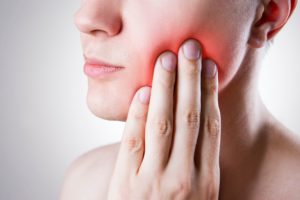Jaw pain is a relatively common complaint amongst patients that can have any number of causes. Anything from a new workout routine to gum disease or even a heart attack can leave you with pain in your jaw.
Since there are so many things that can influence the muscles in your jaw or cause your pain, it may be frustrating to seek answers. Generally, you need look no further than issues right inside your mouth. Here are three common causes of pain within your jaw.

Untreated Cavities
Cavities can affect anyone at any age. Even as an adult, you shouldn’t rule them out as a potential issue. Because of the way cavities form, you may not be aware that you have a cavity unless you begin to feel pain or your dentist catches it during a dental examination.
The natural bacteria that live in your mouth feed on the sugar left behind in your mouth. It forms an acid that will begin to break down the protective layer on your teeth called enamel. At the beginning stages of a cavity, you may not experience any discomfort. That is, until the cavity begins to grow and decay more of your tooth.
Cavities begin to cause pain once the dentin (a protective tissue) and the pulp—the inner portion of the tooth that is composed of nerves, connective tissues, and blood vessels—is exposed. Untreated cavities are susceptible to infections, which can cause pain in your jaw as well as your teeth.
It is vital to treat cavities with a filling in order to reduce your pain and the risk of further decay, infection, or tooth loss. Advanced tooth decay may mean that you need a root canal or a total tooth extraction. You may even develop gum disease.
Teeth Grinding
Grinding your teeth (also known as bruxism) can be a contributor to your jaw pain. There is not one single cause of teeth grinding. You will need to take a look at your lifestyle in order to figure out the root cause.
Stress is usually one of the biggest factors in grinding and clenching your teeth. You may not even be aware that you grind your teeth. It is possible that you do it in your sleep. Teeth grinding is common in people who have high levels of anxiety and stress, those who may have issues with anger or control, or patients who take certain medications.
Over time, grinding your teeth will wear down your enamel and deform the shape of your teeth. This can lead to sensitivity and leave you more susceptible to tooth decay. The constant stress and tension in your jaw will make the muscles tired and overworked causing pain within your jaw. You may even crack or break your teeth due to the force of clenching and grinding your teeth.
Temporomandibular Joint and Muscle Disorders (TMD)
TMD, typically referred to as TMJ, is the pain or discomfort in the joint of your jaw that allows it to hinge open and closed. It is a relatively common condition that affects millions of people.
You may experience pain or tenderness and maybe even a clicking or popping sensation in your jaw. TMJ can cause difficulties eating or speaking because the muscles in your jaw are limiting your movement.
Potential causes of TMJ include teeth grinding, stress, a deformity with the muscles or in the jaw joint, or trauma to the jaw. In order to combat the pain in your jaw, you may be advised to take anti-inflammatory medications, participate in no-drug therapies, or even undergo surgery.
